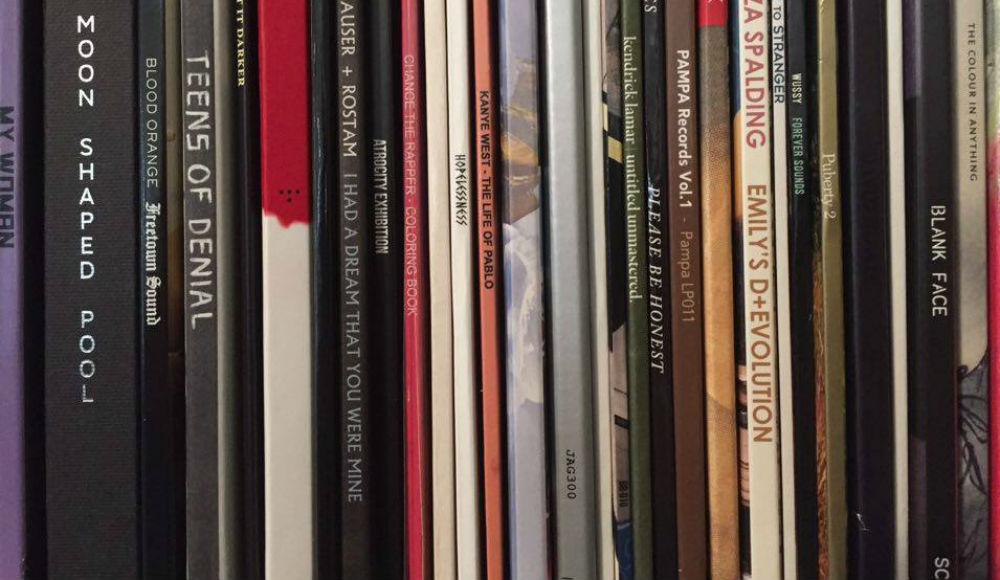The Collapsar and Friends' Favorite Albums of 2016: #'s 20-11
Welcome to part two of our list of our favorite albums of 2016. If you missed it yesterday you can find part 1 here. Look for part 3 tomorrow and hit us up on Facebook or Twitter to let us know what you think. We've got another strong batch up today. That's enough for now--let's get on to the list. Enjoy! ==
20 | DIIV | Is the Is Are | Captured Tracks

Because of the all the turmoil leading up to the release of Is the Is Are, the album itself seemed to get lost in the shuffle. This is unfortunate because the record stands as one of the most underrated efforts of 2016. By doubling the length of their first album, Oshin, DIIV let their tracks breathe and apply more textural, disorienting touches, without fully succumbing to the ether. As a result, many of the tracks on it shine, especially “Bent (Roi’s Song),” “Mire (Grant’s Song),” and “Dust.” They continue to wear their influences on their sleeve (The Cure, CAN, Sonic Youth, My Bloody Valentine), but front-man Zachary Cole Smith is deft enough to make sure they never overwhelm the group’s individuality. Though the album landed with a resounding thud back in January, this is the kind of record where repeated listens will reward the listener. –Brian Flota
19 | Anderson .Paak | Malibu | Empire/Obe/Steel Wool/Art Club

It’s not hard finding the jazz roots in Anderson .Paak’s second album. The much harder challenge is parsing all the influences permeating Malibu’s foundation, cultural or otherwise. Here’s a masterful marriage of 60s soul, epic 70s rock, and old school hip-hop (Am I old enough to say, “old school?”). But enough about that. What’s more interesting, at least for the storyteller in me, is the narrative Anderson spins about his struggles and how they are tied to his music. The whole album is intimate, more like a piano bar dialogue than something recorded in a studio. —Andy Arnold
18 | Nick Cave & The Bad Seeds | Skeleton Tree | Bad Seed LTD

In a year where both David Bowie and Leonard Cohen released albums about confronting death, a different album entirely helped me grapple with the loss of those artists. Before one reaches the acceptance offered by Blackstar and You Want it Darker, The Skeleton Tree indulges the many facets of heartbreak felt by those left behind. “They told us our gods would outlive us,” sings Cave, “but they lied.” Here, Cave leaves no nook or cranny of grief unexplored. He lashes out at perceived voyeurs to his anguish, recoils from others’ well-meaning attempts to comfort, and dreads the sadness that will wash over him in instances of mundanity. Cave ends The Skeleton Tree with the repeated assertion “it’s alright now.” He doesn’t sound all that sure of himself, but who would in his place? Cave’s teenage son fell from a cliff to his death during the recording of the album. If Cave can even try to tell himself he’ll be alright after his devastating loss, I know I will be. –Frank Matt
17 | Rihanna | ANTI | Roc Nation/Westbury Road

“ Rihanna's Anti is underrated. Don't @ me.” tweeteth Chance the Rapper on December 8. One can only assume he is referring to the album’s ranking on the array of “Best of” lists now in full bloom; it’s present on most, but not up high. Albums released in January come at an obvious disadvantage, and it could be argued that “Work” was a misleading first single—a dancehall beat and stock Drake verse misrepresents the risks the rest of the tracks take. ANTI was a prelude to what Chance and Frank and the Knowles sisters would put out in the months that followed; we just couldn’t hear it yet. —Susannah Clark
16 | ANOHONI | Hopelessness | Secretly Canadian

Climate change, mass surveillance, the death penalty and drone assassinations—there’s seemingly no subject matter or uncomfortable phrase that Anohni can’t incorporate into a haunting and infectious croon. At the climax of “Watch Me,” I’ve come perilously close to singing “chiild molesstahhhs” out loud while wearing my headphones on the subway. Anohni’s songs do more than get stuck in our heads, though—they get under our skin. She takes on the voice of a nine-year-old Afghan girl who begs a drone to kill her so she can rejoin her family in the afterlife. She hopes “daddy”—the surveillance state—is watching her watch pornography. “I want to see them burn,” she says of animals threatened by rising global temperatures. But counterintuitively, the more Anohni sings I, me or my, the more I hear you. “You who say nothing and do nothing,” I imagine her saying, “This must be what you want.” –Frank Matt
15 | James Blake | The Colour in Anything | Polydor

Released so early in the year, I’d almost thought this album didn’t qualify for a 2016 year-end list, James Blake’s The Colour in Anything makes good on every promise his lovely self-titled established. Blake’s effortless, wavering voice and perfect oddity production nearly steal the show. Every song is imbued with a sense of place and ambience. And yet, on this album, the production is only half the reason to listen. Blake has always been the master of minimalist lyrics, and here, his looping repetition has just enough well-timed surprises to rip listeners awake. In 2016, a year where my brain has been caught in endless, inescapable loops for personal and political reasons, The Colour in Anything has been the album I most needed. –Alex Hughes
14 | Leonard Cohen | You Want it Darker | Columbia

Leonard Cohen’s final record is a precious gift for anyone feeling anxious about their mortality (i.e. everybody?). To hear this man at the end of his life sound so grateful and prepared is like being given a blueprint for letting go. And to know he remained full of music and poetry right to the very end is a great comfort. Over the years, Leonard Cohen wrote a lot of songs from the ashes of a disintegrated love affair, for a woman he’s accepted losing with dignity and perspective. On You Want It Darker, he writes those kinds of songs for the world. –Eric Wallgren
13 | Kendrick Lamar | untitled unmastered | Top Dawg/Aftermath/Interscope

Fans of Kendrick Lamar and late night television will recognize a few of these tracks in bits and pieces from various live appearances. Coming from the To Pimp a Butterfly sessions, Lamar is working with jazz, funk, and more avant-garde styles. “Untitled 3” is a politically tinged conversation between Lamar and various voices from a range of demographics over a cool, laid back jazz backing track. The recorded version doesn’t quite match the fire of the live performance from the Colbert Report and it misses Terrace Martin on saxophone, but it’s a fascinating peek into where Lamar starts with a track and how it can evolve through freestyling and new collaborators to fit a different occasion. –Carrie Walker
12 | Blood Orange | Freetown Sound | Domino

St. Augustine’s Confessions tells the tale of the author’s rapturous religious epiphany and conversion to Christianity. Freetown Sound is Hynes’ epiphany that he must search further than his own experiences, as well as an ecstatic account of what he finds, both close to and far from his parents’ home of Freetown, Sierra Leone: truth. He raises his own pleas along with those of feminist slam poets, Trayvon Martin, and ghosts of New York's 80’s ball culture. These diverse pleas are answered simultaneously with the wisdom of prophets Marlon James, Missy Elliot, Ta-Nehisi Coates and South African peace activist Nontetha Nkwenkwe. Hynes names a song for St. Augustine and borrows his lament in an attempt to discover and love the newfound truth outside himself—what Augustine called “beauty so ancient and so new.” Of course, Augustine’s work was meant to inspire conversion. Hopefully many will be converted to St. Dev Hynes’ gospel of self-worth. –Frank Matt
11 | A Tribe Called Quest | We Got it From Here...Thank You 4 Your Service | Epic

After eighteen years and the death of founding member Phife Dawg, most of us were pretty sure that Tribe were done for good. But then, of course we find out they’d been recording a new album and it was going to drop not-quite-but-close-to-out-of-the-blue. Perhaps more surprising than the album’s actual existence, though, especially considering the group’s downward arc through the late 90’s, is that not only is that new album, We Got it From Here…Thank You For Your Service, a good album, but that it might be the best of Tribe’s career. From the urgent one-two opening punch of “The Space Program” and “We the People…” to the politically charged but still chill “Dis Generation” to the elegant anger of “The Killing Season,” We Got it From Here… is an honest, hopeful, and mature album that finds some of hip hop’s most respected elder statesman holding court together one last time in an attempt to grow beyond themselves and forge a more empathetic and inclusive culture. –James Brubaker




